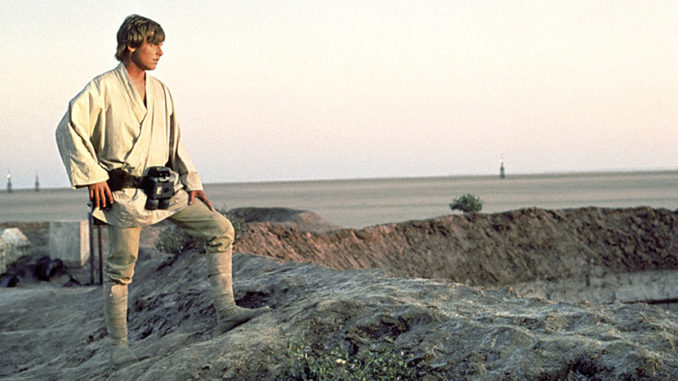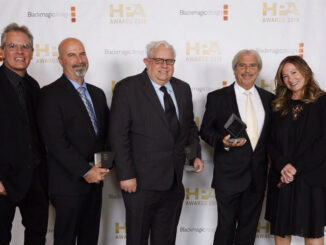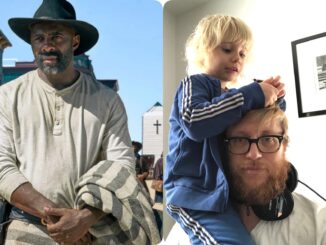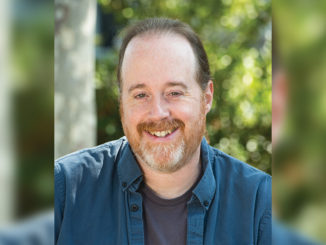
by Ray Kolasa
Given how important motion pictures have been to my personal and professional life over the past few decades, it sometimes amazes me that I have so few memories of seeing movies as a kid. I remember watching various Three Stooges comedies and Godzilla films, and I persuaded my father to take me to such “adult” fare as Logan’s Run and Westworld. (Yeah, so I was a bit of a sci-fi geek; tell me something I don’t know.) But given that my family was never much for going to the movies, I was never that active a filmgoer in my youth.
So it wasn’t until the summer of 1977 that my fate was sealed by the sucker punch of the biggest Hollywood blockbuster of my generation. The success of Star Wars may have taken the country (not to mention 20th Century Fox) by surprise back then, but not me. I’d first heard about the film at a New York City comic book convention the year before, and had been following its progress in Starlog and other geeky fan magazines. So when it was finally released and hit big, I was ready for it.
As most everyone knows (heck, it was almost a national holiday), the film opened on May 25, 1977. But what’s hard to believe now, when franchise pictures routinely open on thousands of screens, Star Wars premiered in only 43 theaters and grossed a now-meager $1.5 million in its opening weekend. I didn’t see it that weekend as it had yet to open in my hometown of Rochester, New York. It wasn’t until a couple of Fridays later, in early June––after I had just turned fifteen and only a few weeks before my family conveniently moved to Southern California––that I finally had the opportunity to see the film that would have such a profound impact on my adolescent life and future career.
I certainly wasn’t the film’s biggest fan that summer. I saw it maybe seven or eight times, but that was nothing compared to the stories I read of fans who saw it dozens if not hundreds of times. I was crazy about it, sure, but I wasn’t obsessed––those people were nuts (at least that’s what I kept telling myself).
Entire generations can now be defined as being pre- and post-StarWars.
But I loved the film like nothing before it and it left a lasting impression. I read the novelization, I collected the fan magazines and comic books; I bought the action figures, built the model kits, and wondered how cool it would be if The Force was real. It was the Beatlemania of my generation. A year later, when I finally got a Super-8 movie camera, I filmed my Millennium Falcon model against a black velvet backdrop in an attempt to duplicate, in my own primitive way, the model animation that John Dykstra, Richard Edlund and others perfected in the film. I even blew up a few ships after reading about how Joe Viskocil created the miniature explosions in a Los Angeles parking lot. It was my life’s ambition to work in special effects, but I quickly came to realize that I had absolutely no talent for it.
Ultimately, I came to the conclusion that what I appreciated most about the film wasn’t the spellbinding visual effects but George Lucas’ compelling storytelling. The way he mixed mythological touchstones, archetypal characters, and genre film conventions seems so simple and obviously commercial in retrospect, but it felt risky and breathtakingly fresh at the time.
Sure, more than 25 years later the film feels a bit dated, with corny dialogue, stiff acting and special effects that seem almost quaint by contemporary standards. But for me what works is the purity of the emotion and the nearly primal conflict between good and evil. Actually, the most memorable moment of the film, to me, is one sans dialogue, action and all but the simplest of visual effects. It’s that shot of Luke gazing yearningly out over Tatooine at sunset as the planet’s twin suns slowly sink toward the horizon. That’s the scene that still moves me the most to this day; it’s one of my favorite scenes in the history of cinema.
The broad cultural significance of Star Wars has been written about elsewhere; so too its impact on the motion picture industry as a whole. Entire generations can now be defined as being pre- and post-StarWars. I’m convinced that it’s caused more people to enter the film industry than any other motion picture in history. And I’m one of them.




